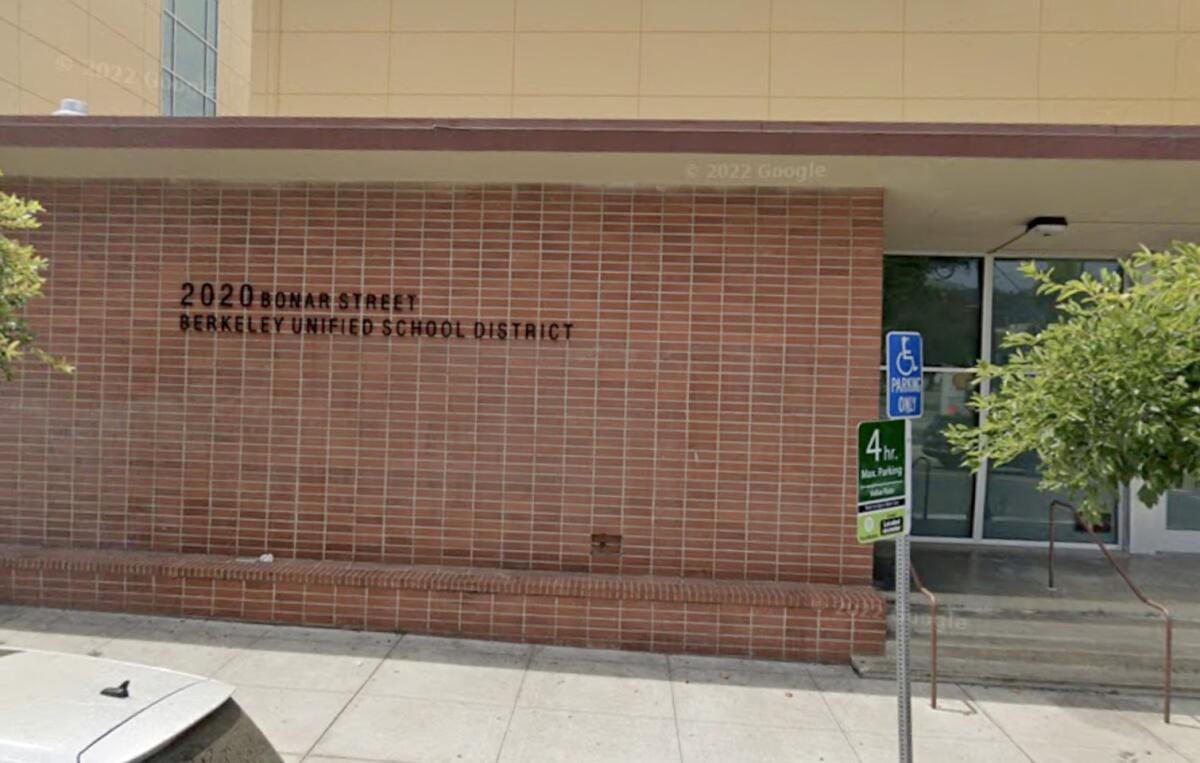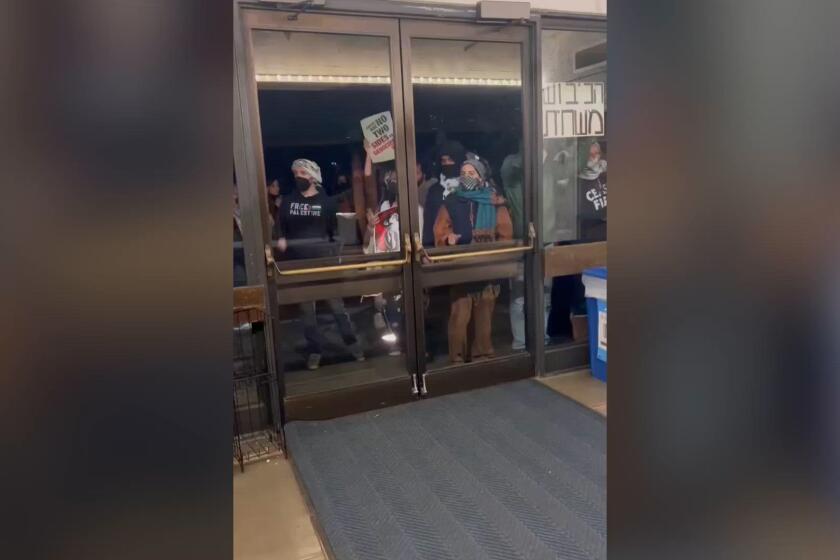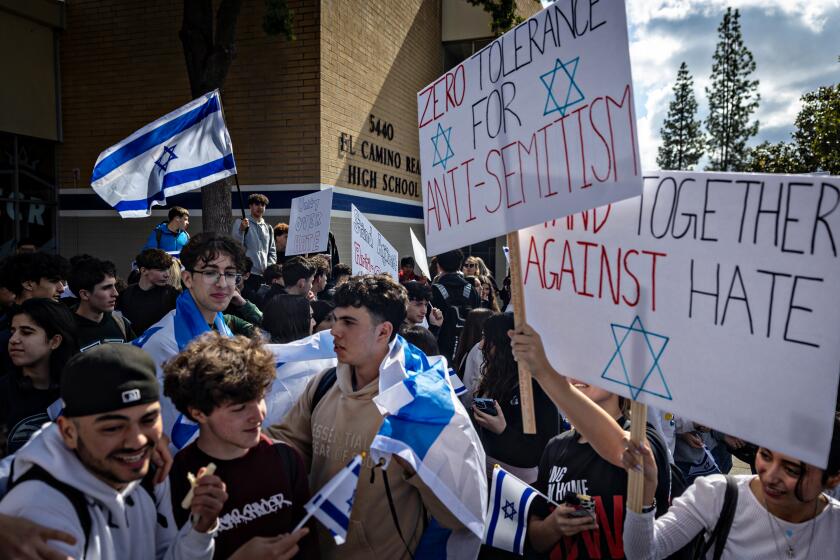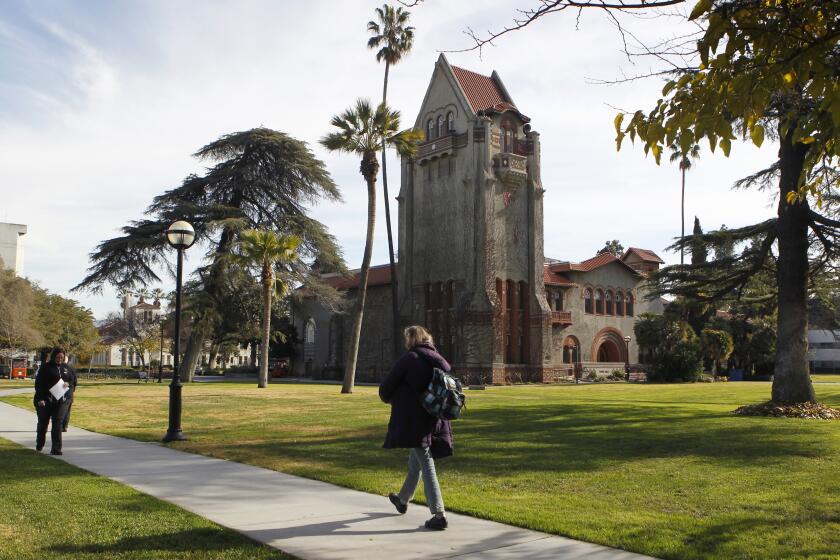Berkeley public schools hit with complaint alleging ‘severe and persistent’ antisemitic bullying

- Share via
The week after Hamas’ Oct. 7 attack on Israel, Ilana Pearlman asked her 14-year-old son, Ezra, a ninth-grader at Berkeley High School who is Black and Jewish, if he felt safe.
“Oh, yeah, I’ll be fine,” he told her. “I’m Black.”
For the record:
6:18 a.m. March 1, 2024An earlier version of this article said the complaint against Berkeley schools was the first antisemitism case filed with the Department of Education’s Office of Civil Rights against a public school district since Oct. 7. In recent months, the Office for Civil Rights has received complaints of antisemitism in school districts including Oakland, San Francisco and Chicago.
In an earlier version of this aticle, an exchange between Ezra and Ilana Pearlman about his ancestry project was incorrectly reported to have been between Ezra and his teacher.
An earlier version of this article said 1,300 Berkeley community members signed a letter to the school district protesting the “lack of care” for Jewish children. The signatories include not just Berkeley community members, but “concerned allies of the Jewish community” from other cities.
Update:
12:38 p.m. March 3, 2024This article was updated to clarify when information was drawn from the complaint filed with the Office of Civil Rights and when it was obtained through interviews.
Pearlman, a 38-year-old midwife, wanted to cry. She moved to Berkeley thinking it would be a space where her son would not be a token Jewish Black kid, that he could be celebrated for all the things that make him who he is.
Instead, she said, she watched Ezra erase his Jewish identity as the climate at his high school became more hostile to Israel and Jews. His art teacher, he told her, projected “resistance art” — including a fist punching through a Star of David on a map of Israel — on a large screen. Day by day, she said, his classroom wall filled with signs promoting a “walkout against genocide” and posting the daily death toll of Palestinians.
“He never tells me anything,” Pearlman said of her son, a typical video-game-loving teen. “The fact that he shared this was unusual.”
On Oct. 18, Pearlman said, Ezra’s classmates joined a walkout in which some students shouted, “Kill the Jews!”
In the months after the Hamas attack, administrators at Berkeley Unified School District failed to stop teachers and students engaging in “severe and persistent” harassment and discrimination against Jewish children, according to a federal civil rights complaint filed Wednesday with the U.S. Department of Education.
The complaint, filed by the Louis D. Brandeis Center for Human Rights Under Law and the Anti-Defamation League, alleges Berkeley public schools ignored reports of bullying and harassment of Jewish students on the basis of their ethnicity, shared ancestry and national origin. District leaders, it alleges, “knowingly allowed” classrooms and schoolyards to become a “viciously hostile” environment.
Since Hamas’ brutal surprise attack and Israel’s relentless bombardment of the Gaza Strip, students, parents and politicians have warned that antisemitism is rife on college campuses.
But this complaint, which was filed with the Department of Education’s Office of Civil Rights, claims antisemitism pervades public schools that teach students as young as second grade.
In Berkeley, it alleges, middle school and high school teachers organized walkouts for Gaza during school hours, sometimes leaving no instruction for students left behind in class. In another case, it says, an elementary school teacher directed second-graders to write “anti-hate” messages, such as “Stop Bombing Babies,” on sticky notes — and then posted the notes outside the classroom of the school’s only Jewish teacher.
About 200 protesters shut down a private event at UC Berkeley that featured Ran Bar-Yoshafat, an Israeli attorney and former member of the Israel Defense Forces.
The complaint alleges that students followed their teachers’ lead. At one middle school, the complaint alleges, students chanted, “Kill the Jews,” on a walkout. According to the complaint, some Jewish children reported that their classmates asked what their number is — a reference to the numbers tattooed on Jews during the Holocaust.
“The Israel-Gaza conflict has spiked a huge antisemitism crisis in schools,” said Rachel Lerman, general counsel and vice chair of the Brandeis Center. “We can see from the Berkeley schools that what’s going on is clearly antisemitic: When you have rallies for Gaza, with students yelling, ‘F— the Jews’ or ‘Gas the Jews,’ then you have an antisemitism problem. It’s [as] plain as day.”
Some parents of Berkeley students have disputed the Brandeis and ADL attorneys’ account of antisemitism in district schools, saying the complaint is defamatory and falsely conflates antisemitism and criticism of Israel.
“The complaint is replete with false information,” the BUSD Jewish Parents for Collective Liberation said in a statement. “It irresponsibly fabricates or exaggerates a majority of incidents described, and needs to be laid bare for what it is: another harassment tactic intended to censor teaching our children about Palestine.”
“By mischaracterizing messages that support Palestinian human rights as somehow dangerous to Jewish students, the complaint is full of anti-Palestinian and anti-Arab messages,” the group added. “It endangers our children, their right to free assembly and their right to learn.”
Responding to the federal complaint, Berkeley Unified School District Supt. Enikia Ford Morthel said the district continuously encourages students and families to report “any incidents of bullying or hate-motivated behavior” and “vigorously investigates” every report.
The district had not received official notification of the federal complaint, Ford Morthel said, but would work with the Office of Civil Rights to support a “thorough investigation.”
“We believe that classrooms are spaces where all students need to feel safe, seen, felt, and heard,” Ford Morthel said in a statement. “We work to make these spaces responsive and humanizing for our diverse students, today and every day.”
Since Oct. 7, the Department of Education’s Office for Civil Rights has received a number of complaints of antisemitism, including school districts in Oakland, San Francisco and Chicago.
Ezra stayed in school when many of his classmates joined the Oct. 18 walkout, Pearlman said. Other Jewish students who attended — because they supported the Palestinian cause — left, she said, as the chants moved swiftly from “From the river to the sea” to “Kill the Jews.”
“It dawned on them: ‘This is not good,’ ” Pearlman said.
At a later walkout at Martin Luther King Jr. Middle School, Pearlman said she watched grown-ups unlock and open the gates for students to leave campus. Pearlman wasn’t bothered as students chanted, “From the river to the sea, Palestine will be free” — a chant that Palestinian activists say is an expression of solidarity for Palestinians but many Jews interpret as a call for Israel’s destruction.
But then, she said, the chants morphed to “KKK.” She felt she was living in an upside-down world as she watched kids moving through the crowd, asking marchers, “Are you Jewish? Are you Muslim?”
“Oh, hell no,” she said she heard students respond: “F— Israel. F— the Jews.”
She said she approached school administrators, but they did nothing.
“I don’t blame the kids,” she said. “I hold administrators responsible for not shutting hate speech down. When it comes to Jews, it’s just, ‘Eh, they’ll get over it.’ ”
Pearlman pushed administrators to let Ezra attend a different art class. According to Pearlman, her son’s new art teacher wore “Free Palestine” patches on her clothes and told students about the mental health day she says she needed because of the war in Gaza and the protests she had to attend.
She said Ezra stopped going to Jewish teen events every Wednesday night. When she went over his ancestry project for ethnic studies, Pearlman said, the only part of his ancestry Ezra included was his Black side. He didn’t mention he was Jewish or that his ancestors were Holocaust survivors.
“I’m a little offended, dude,” Pearlman said she told Ezra. “What about your entire Jewish side?”
“Eh, it’s not really the right climate for that,” she said Ezra told her.
Chiara Juster, the mother of an eighth-grader at Willard Middle School, said students called her daughter, 13, a “midget Jew” in the hallway between classes the week before Oct. 7. After changing classes to avoid bullying from her peers, Juster said, her daughter found herself in a homeroom with a history teacher who displayed a Palestinian flag and posters calling for a cease-fire. She began to feel unsafe, Juster said, when her teacher urged students to join the after-school watermelon club — the watermelon has become an unofficial symbol of Palestinian solidarity in protests — if they wanted to learn the truth about what’s happening in Gaza.
“Students are not feeling safe,” said Juster, 43, a former attorney. “Inside the classroom, schools need to create a really safe environment. Don’t brainwash; don’t try to influence kids with a particular set of beliefs.”
Students at El Camino Real Charter High School staged a walkout Tuesday to protest antisemitic incidents on the Woodland Hills campus.
Juster pulled her daughter out of Willard. But she said she didn’t feel comfortable sending her to neighboring Martin Luther King Jr. Middle School after hearing students had chanted, “Kill the Jews.” She is now homeschooling her daughter.
“We came to Berkeley because we thought it would be safe,” Juster said. “I never thought I’d be taking my kid out of school over antisemitism. If this were any other ethnic minority, it would not be tolerated.”
At a time when educational institutions across the country are grappling with how to balance public teachers’ and students’ free speech with rhetoric that can be interpreted as hostile or discriminatory, the complaint argues that Berkeley went too far in allowing teachers to promote personal political views.
Teachers, the complaint alleges, violated the district’s “Controversial Issues” policies that state, “Teachers within BUSD are dedicated to creating safe spaces where students can explore differing viewpoints.” Another district policy prohibits teachers from using their positions to promote a “historical, religious, political, economic, or social bias.”
The complaint accuses Berkeley teachers of using class time to “indoctrinate other students with antisemitic rhetoric, tropes and false information about Israelis and Jews.” It cites the example of a teacher who posted a photo on social media on Oct. 7 of a bulldozer breaking through a fence: “A historic act of resistance happened in Palestine today,” the teacher wrote.
“While this complaint is not intended to regulate the private speech of BUSD teachers,” the complaint argues, “these teachers bring their personal, biased viewpoints into the classroom and make their students feel more unsafe with their public viewpoints.”
The complaint alleges that parents’ concerns about BUSD schools went ignored for months.
In November, more than 1,300 Berkeley parents and “concerned allies of the Jewish community” signed a letter to the Berkeley superintendent and Board of Education stating that they were “dismayed, disappointed and frightened by the district’s lack of care” for Jewish children. The letter also urged administrators to “take active steps to ensure our Jewish kids feel physically and psychologically safe at school.”
The complaint alleges a number of incidents of harassment of Jewish students by classmates and teachers. For example, after a parent reported a second-grade teacher for antisemitic conduct, the teacher allegedly approached the parent and threatened him: “I know who you are, I know who your f— wife is and I know where you live.”
As a result, children who once wore Star of David pendants were hiding visible displays of their Judaism, the complaint states. Although some Jewish and Israeli students have left the district, the complaint asserts, others remain enrolled but afraid to go to school.
The history professor is accused of grabbing and twisting the arm of a student who tried to block him from videotaping a protest.
Will Creeley, legal director of the Foundation for Individual Rights and Expression, a nonprofit civil rights group, said the complaint brings together a huge range of allegedly discriminatory actions. Different actions, he argued, require different responses.
A public school teacher has the right to speak as a private citizen on Israel or other matters, Creeley said. But that gets trickier, he said, if a teacher speaks about those matters in their official capacity as a teacher.
“If a teacher engages in a pattern of conduct in the classroom that includes talking about Israel and Palestine and anti-Zionist or anti-Jewish sentiment over time,” Creeley said, “you can begin to imagine that such conduct, over time, would satisfy the bar for hostile environment discrimination.”
Since Oct. 7, communities across the country have alleged that antisemitism is soaring, including graffiti and vandalism at Jewish stores and synagogues as well as physical attacks on people wearing Star of David pendants.
The Anti-Defamation League tracked 3,283 reported antisemitic incidents between Oct. 7 and Jan. 7 — a 361% increase from the 712 incidents reported during the same period the year before.
Palestinian Americans also have noted a rise in incidents of hate and discrimination. The Council on American-Islamic Relations said last month it received 3,578 complaints of anti-Muslim and anti-Palestinian discrimination during the last three months of 2023 — a 178% increase from the same period the year before.
More to Read
Sign up for Essential California
The most important California stories and recommendations in your inbox every morning.
You may occasionally receive promotional content from the Los Angeles Times.













